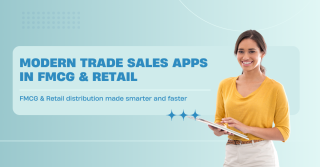Field Sales Software: Future Trends to Watch in 2024

The evolution of field sales has taken a significant leap forward with the advent of sophisticated software designed to supercharge the productivity and efficiency of sales teams. In a challenging and ever-changing economic environment, harnessing technology is no longer an option but a necessity for businesses that aim to thrive. With 2024 upon us, it’s crucial to understand the pivotal role of field sales software in steering sales success.
In this comprehensive guide, we’ll dissect the myriad of ways in which field sales software not only streamlines operations but also catalyzes business growth. If you're a Sales Manager or a Field Sales Agent navigating the plethora of options available, read on to arm yourself with valuable knowledge that can set you and your team apart.
The Importance of Field Sales Software in the Modern Business Landscape
The days of managing sales with spreadsheets, maps, and manual logs are long past. Modern business demands agility, accuracy, and real-time decision-making capabilities from its sales force. Field sales software is the cornerstone for meeting these demands, offering an integrated platform that supports the sales cycle from lead generation to deal closure and beyond.
Benefits of Field Sales Software
Increased Productivity and Efficiency
Automation is at the heart of field sales software, enabling sales reps to focus on their most important task – selling. By minimizing administrative duties and diminishing human errors, these tools allow sales teams to cover more ground with less effort.
Improved Communication and Collaboration
Effective field sales hinge on teamwork and fluid communication. Field sales software fosters a connected workforce, regardless of location, ensuring that critical information is shared and accessible for everyone involved.
Enhanced Customer Relationship Management
Today’s field sales software does more than track visits and sales; it offers a comprehensive suite of CRM tools that facilitate a deeper understanding of customer needs and behaviors, paving the way for personalized and impactful sales strategies.
Key Features to Look for in Field Sales Software
The market is awash with solutions, each presenting a host of features. However, certain functionalities stand out as must-haves:
Mobile Accessibility and Offline Capabilities
Sales happen on the go, and your software should too. The best field sales software offers robust mobile applications that function offline, ensuring productivity is not hampered by patchy connections.
Real-time Analytics and Reporting
Staying ahead means staying informed. With real-time analytics, sales managers and agents can track performances, identify trends, and make data-driven decisions instantly.
Integration with CRM and Other Tools
A seamless ecosystem is key to sales efficiency. Field sales software should integrate effortlessly with your existing CRM and additional tools to streamline processes and aggregate data.
Top Field Sales Software in 2024
In-depth reviews and comparisons of leading software solutions have highlighted top contenders that excel in functionality, user experience, and support.
The well-known field sales software in 2024 includes Delta Sales App, Salesforce, HubSpot Sales Hub, Zoho CRM, and Microsoft Dynamics 365 Sales
Delta Sales App:
The Delta Sales App is a field sales force automation software designed to effectively manage sales teams and activities, contributing to revenue growth for companies. It addresses common field sales reporting challenges encountered by field representatives, sales managers, and management teams on a day-to-day basis. This SaaS-based Android app facilitates the seamless management of distributors, wholesalers, retailers, and field sales employees, offering features such as:
Tracking field employees and their activities
Enhancing the efficiency of the field force
Automating the sales ordering process
Providing a real-time and accurate view of sales activities
Making customer information easily accessible to field representatives
Increasing customer engagements
Reducing administrative and manual tasks
Accelerating sales processes
Salesforce:
Salesforce is a cloud-based Customer Relationship Management (CRM) software. Its purpose is to streamline the prospecting process for companies, facilitating the identification of more potential customers.
Hubspot:
HubSpot is a CRM software that operates in the cloud, with the aim of aligning sales and marketing teams. It supports sales enablement, enhances Return on Investment (ROI), and optimizes your inbound marketing strategy to generate a higher quantity of qualified leads.
Zoho CRM:
Zoho CRM serves as a unified repository, consolidating your sales, marketing, and customer support activities. It streamlines your processes, policies, and personnel within a single platform.
Microsoft Dynamics 365 Sales:
Microsoft Dynamics 365 Sales is specialized sales management software crafted to provide your organization with a comprehensive understanding of vital business development processes.
Implementation and Training Considerations
A thoughtful approach to implementing new software can determine its success. Beyond the technical set-up, consider the human element – foster buy-in through clear communication of the benefits.
Tips for Successful Implementation and Adoption
Present a clear use-case scenario.
Involve sales teams in choosing the software.
Set realistic timelines.
Training Resources and Support Available
Choose software providers that offer comprehensive training resources – from webinars to live support, ensuring your team doesn't just learn the software but masters it.
Future Trends in Field Sales Software
Predictive analytics, artificial intelligence, and enhanced mobile capabilities are just a few trends poised to redefine field sales software. Keep an eye on developments that promise to make sales processes more intuitive and customer-focused.
How to Evaluate the Best Field Sales Software for Your Team
Selecting the ideal field sales software is pivotal for empowering your team and improving bottom-line results. Consider using a structured approach:
Assess Current Sales Processes: Understand the specific needs and pain points of your sales cycle.
List Must-Have Features: Determine which features are essential for your team's success and align with your sales strategy.
Request Demonstrations and Trials: Engage with vendors to see their solutions in action. Use trials to test software in real conditions.
Check References and Reviews: Reach out to peers in your industry or read comprehensive reviews to gauge the software's performance and reliability.
Consider Scalability and Flexibility: Ensure that the software can grow with your business and can adapt to changing market dynamics.
By meticulously evaluating the available field sales software against this criterion, you can make an informed decision that will have a lasting positive impact on your sales operations.
Conclusion
Navigating field sales challenges in 2024 and beyond will require leveraging the right technology. By understanding your team's needs, staying abreast of the latest developments, and choosing a solution that scales with your business, you ensure that field sales software becomes a powerful ally in achieving business success.
Stay ahead of the curve by embracing the right tools, training, and tech trends, and witness your field sales soar to new heights!








